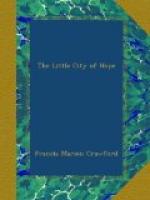“It’s of no use!” he cried, suddenly rising and turning away. “I cannot stand it. I’m sorry, but it’s too awful!”
Never before had he felt so thoroughly ashamed of himself. He was breaking down before his son, to whom he knew he ought to be setting an example of fortitude and common sense. He had forgotten the very names of such qualities; the mere thought of Hope, whenever it crossed his mind, mocked him maddeningly, and he hated the little City for the name he had given it. Hope was his enemy since she had left him, and he was hers; he could have found it in his heart to crush the poor little paper town to pieces, and then to split up the very board itself for firewood.
The years that had been so full of belief were all at once empty, and the memory of them rang hollow and false, because Hope had cheated him, luring him on, only to forsake him at the great moment. Every hour he had spent on the work had been misspent; he saw it all now, and the most perfect of his faultless calculations only proved that science was a blatant fraud and a snare that had cost him all he had, his wife, his boy’s future, and his own self-respect. How could he ever look at his wretched failure again? How could he sit down opposite the son he had cheated, and who was going to starve with him, and play with a little City of Hope, when Hope herself was the lying enemy that had coaxed him to the destruction of his family and to his own disgrace? As for teaching again, who ever got back a good place after he had voluntarily given it up for a wild dream! Men who had such dreams were not fit to teach young men in any case! That was the answer he would get by post in a day or two.
Newton watched his father anxiously, for he had heard that people sometimes went mad from disappointment and anxiety. The pale intellectual face wore a look of horror, as if the dark eyes saw some dreadful sight; the thin figure moved nervously, the colourless lips twitched, the lean fingers opened and shut spasmodically on nothing. It was enough to scare the boy, who had always known his father gentle, sweet-tempered, and hopeful even under failure; but Overholt was quite changed now, and looked as if he were either very ill or very crazy.




